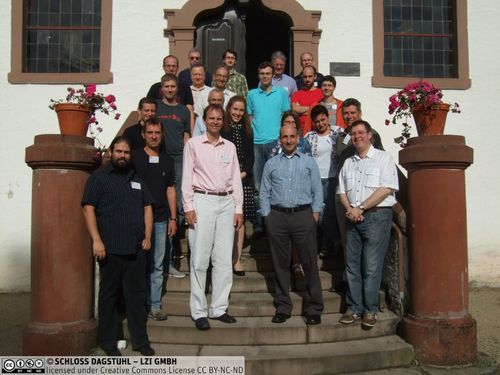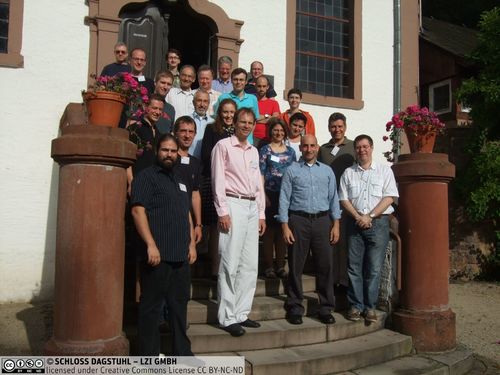Dagstuhl Seminar 12331
Mobility Data Mining and Privacy
( Aug 12 – Aug 17, 2012 )
Permalink
Organizers
- Christopher W. Clifton (Purdue University - West Lafayette, US)
- Bart Kuijpers (Hasselt University - Diepenbeek, BE)
- Katharina Morik (TU Dortmund, DE)
- Yucel Saygin (Sabanci University - Istanbul, TR)
Contact
- Annette Beyer (for administrative matters)
Impacts
- Privacy through Uncertainty in Location-Based Services : article pp. 67-72 in: 2013 IEEE 14th International Conference on Mobile Data Management, 978-1-4673-6068-5 - Merrill, Shawn; Basalp, Nilgün; Biskup, Joachim; Buchmann, Erik; Clifton, Christopher W.; Kuijpers, Bart; Othman, Walied; Savas, Erkay - Los Alamitos : IEEE, 2013 - (2013 IEEE 14th International Conference on Mobile Data Management : pp. 67-72).
- Report from Dagstuhl: the liberation of mobile location data and its implications for privacy research : article : pp. 7-18 - Andrienko, Gennady; Gkoulalas-Divanis, Aris; Gruteser, Marco; Kopp, Christine; Liebig, Thomas; Rechert, Klaus - New York : ACM, 2013 - (Mobile computing and communications review : 17. 2013, 2).
Schedule
Mobility Data Mining and Privacy aimed to stimulate the emergence of a new research community to address mobility data mining together with privacy issues. Mobility data mining aims to extract knowledge from movement behaviour of people. This is an interdisciplinary research area combining a variety of disciplines such as data mining, geography, visualization, data/knowledge representation, and transforming them into a new context of mobility while considering privacy which is the social aspect of this area. The high societal impact of this topic is mainly due to the two related facets of its area of interest, i.e., people's movement behaviour, and the associated privacy implications. Privacy is often associated with the negative impact of technology, especially with recent scandals in the US such as AOL's data release which had a lot of media coverage. The contribution of Mobility Data Mining and Privacy is to turn this negative impact into positive impact by investigating how privacy technology can be integrated into mobility data mining. This is a challenging task which also imposes a high risk, since nobody knows what kinds of privacy threats exist due to mobility data and how such data can be linked to other data sources.
The seminar looked closely at two application areas: Vehicular data and cellular data. Further discussions covered two specific new general approaches to protecting location privacy: context-dependent privacy, and location uncertainty as a means to protect privacy. In each of these areas, new ideas were developed; further information is given in the working group reports.
The seminar emphasized discussion of issues and collaborative development of solutions -- the majority of the time was divided between working group breakout sessions follow by report-back and general discussion sessions. While the working group reports were written by subgroups, the contents reflect discussions involving all 22 participants of the seminar.
The seminar concluded that there are numerous challenges to be addressed in mobility data mining and privacy. These challenges require investigation on both technical and policy levels. Of particular importance is educating stakeholders from various communities on the issues and potential solutions.
- Gennady Andrienko (Fraunhofer IAIS - St. Augustin, DE) [dblp]
- Nilgün Basalp (Istanbul Bilgi University, TR)
- Joachim Biskup (TU Dortmund, DE) [dblp]
- Erik Buchmann (KIT - Karlsruher Institut für Technologie, DE)
- Christopher W. Clifton (Purdue University - West Lafayette, US)
- Maria Luisa Damiani (University of Milan, IT) [dblp]
- Glenn Geers (Data61 / NICTA - Sydney, AU) [dblp]
- Aris Gkoulalas-Divanis (IBM Research - Dublin, IE)
- Marco Gruteser (Rutgers University - New Brunswick, US) [dblp]
- Christine Körner (Fraunhofer IAIS - St. Augustin, DE)
- Bart Kuijpers (Hasselt University - Diepenbeek, BE)
- Thomas Liebig (Fraunhofer IAIS - St. Augustin, DE) [dblp]
- Bradley Malin (Vanderbilt University - Nashville, US) [dblp]
- Michael Marhöfer (Oberhaching, DE)
- Walied Othman (Universität Zürich, CH) [dblp]
- Klaus Rechert (Universität Freiburg, DE)
- Claudia Sánta (TU München, DE)
- Erkay Savas (Sabanci University - Istanbul, TR) [dblp]
- Florian Schaub (Universität Ulm, DE) [dblp]
- Olaf Spinczyk (TU Dortmund, DE) [dblp]
- Christian Wietfeld (TU Dortmund, DE)
- Ouri E. Wolfson (University of Illinois - Chicago, US) [dblp]
Classification
- databases / information retrieval
- security / cryptography
- computer graphics / computer vision
- society / HCI
Keywords
- spatio-temporal databases
- mobility data mining
- privacy-preserving mining
- data visualization



